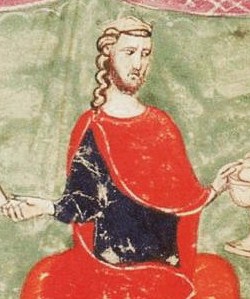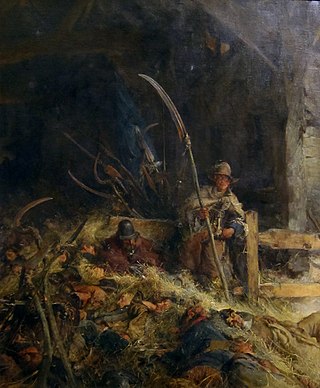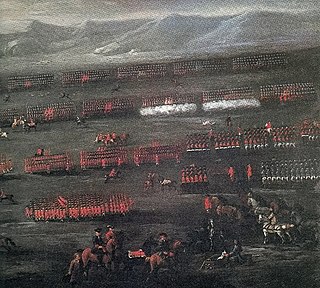
Perkin Warbeck was a pretender to the English throne claiming to be Richard of Shrewsbury, Duke of York, who was the second son of Edward IV and one of the so-called "Princes in the Tower". Richard, were he alive, would have been the rightful claimant to the throne, assuming that his elder brother Edward V was dead and that he was legitimate—a point that had been previously contested by his uncle, King Richard III.

George II was King of Great Britain and Ireland, Duke of Brunswick-Lüneburg (Hanover) and a prince-elector of the Holy Roman Empire from 11 June 1727 (O.S.) until his death in 1760.

Peter III of Aragon was King of Aragon, King of Valencia, and Count of Barcelona from 1276 to his death. At the invitation of some rebels, he conquered the Kingdom of Sicily and became King of Sicily in 1282, pressing the claim of his wife, Constance II of Sicily, uniting the kingdom to the crown.
Duke of Cornwall is a title in the Peerage of England, traditionally held by the eldest son of the reigning British monarch, previously the English monarch. The Duchy of Cornwall was the first duchy created in England and was established by a royal charter in 1337. Prince William became Duke of Cornwall following the accession of his father, King Charles III, to the throne in 2022, and his wife, Catherine, became Duchess of Cornwall.

Uther Pendragon (Brittonic), also known as King Uther, was a legendary King of the Britons and father of King Arthur.

James Scott, 1st Duke of Monmouth, 1st Duke of Buccleuch, was a Dutch-born English nobleman and military officer. Originally called James Crofts or James Fitzroy, he was born in Rotterdam in the Netherlands, the eldest illegitimate son of Charles II of England with his mistress Lucy Walter.

The Battle of Sedgemoor was the last and decisive engagement between the Kingdom of England and rebels led by the Duke of Monmouth during the Monmouth rebellion, fought on 6 July 1685, and took place at Westonzoyland near Bridgwater in Somerset, England, resulting in a victory for the English army.

The Monmouth Rebellion, also known as the Pitchfork Rebellion, the Revolt of the West or the West Country rebellion, was an attempt to depose James II, who in February 1685 succeeded his brother Charles II as king of England, Scotland and Ireland. A group of dissident Protestants led by James Scott, 1st Duke of Monmouth, eldest illegitimate son of Charles II, opposed James largely due to his Catholicism.

The House of Stuart, originally spelled Stewart, was a royal house of Scotland, England, Ireland and later Great Britain. The family name comes from the office of High Steward of Scotland, which had been held by the family progenitor Walter fitz Alan. The name Stewart and variations had become established as a family name by the time of his grandson Walter Stewart. The first monarch of the Stewart line was Robert II, whose male-line descendants were kings and queens in Scotland from 1371, and of England, Ireland and Great Britain from 1603, until 1714. Mary, Queen of Scots, was brought up in France where she adopted the French spelling of the name Stuart.
Monmouth is a town in Wales.

Duke of Buccleuch, formerly also spelt Duke of Buccleugh, is a title in the Peerage of Scotland created twice on 20 April 1663, first for James Scott, 1st Duke of Monmouth, and second suo jure for his wife Anne Scott, 4th Countess of Buccleuch. Monmouth, the eldest illegitimate son of King Charles II, was attainted after rebelling against his uncle King James II and VII, but his wife's title was unaffected and passed on to their descendants, who have successively borne the surnames Scott, Montagu-Scott, Montagu Douglas Scott and Scott again. In 1810, the 3rd Duke of Buccleuch inherited the Dukedom of Queensberry, also in the Peerage of Scotland, thus separating that title from the Marquessate of Queensberry.

Lucy Walter, also known as Lucy Barlow, was the first mistress of King Charles II of England and mother of James, Duke of Monmouth. During the Exclusion Crisis, a Protestant faction wanted to make her son heir to the throne, fuelled by the rumour that the king might have married Lucy, a claim which he denied.

A pretender is someone who claims to be the rightful ruler of a country although not recognized as such by the current government. The term is often used to suggest that a claim is not legitimate. The word may refer to a former monarch or a descendant of a deposed monarchy, although this type of claimant is also referred to as a head of a house.

The Jacobite peerage includes those peerages created by James II and VII, and the subsequent Jacobite pretenders, after James's deposition from the thrones of England, Scotland and Ireland following the Glorious Revolution of 1688. These creations were not recognised in English, Scots or Irish law, but the titles were used in Jacobite circles in Continental Europe and recognised by France, Spain and the Papacy.

Clan Scott is a Scottish clan and is recognised as such by the Lord Lyon King of Arms. Historically the clan was based in the Scottish Borders.

Manfred Frederick Jaeger was a German-born British film, television, theatre and radio character actor.

Clan Stewart (Gaelic: Stiùbhart) is a Scottish Highland and Lowland clan. The clan is recognised by Court of the Lord Lyon; however, it does not have a Clan Chief recognised by the Lord Lyon King of Arms. Because the clan has no chief it can be considered an armigerous clan; however, the Earls of Galloway are now considered to be the principal branch of this clan, and the crest and motto of The Earls of Galloway's arms are used in the Clan Stewart crest badge. The Court of the Lord Lyon recognises two other Stewart/Stuart clans, Clan Stuart of Bute and Clan Stewart of Appin. Clan Stuart of Bute is the only one of the three clans at present which has a recognised chief.
Events from the year 1685 in England. This year sees a change of monarch.

The Jacobite rising of 1715 was the attempt by James Edward Stuart to regain the thrones of England, Ireland and Scotland for the exiled Stuarts.

A royal bastard is a child of a reigning monarch born out of wedlock. The king might have a child with a mistress, or the legitimacy of a marriage might be questioned for reasons concerning succession.
















